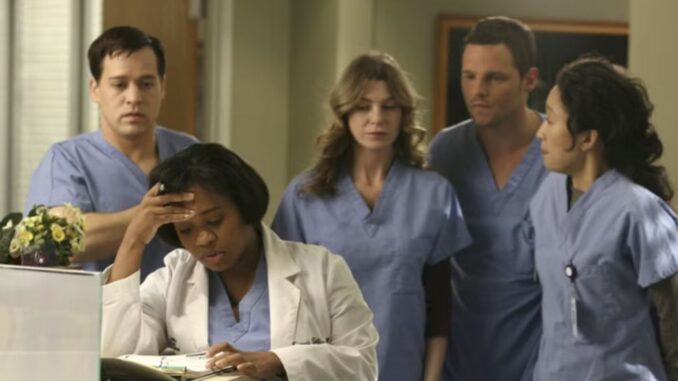
The Baptism of Fire: Interns Meet the Bailey Tornado
The air crackled with a nervous energy, thick enough to choke on. Eight figures, fresh out of medical school, stood huddled in the cramped on-call room, a kaleidoscope of ill-fitting scrubs and wide-eyed apprehension. They were the new interns at Seattle Grace Hospital, a place legendary for its demanding surgeries, cutthroat competition, and, most terrifying of all, its resident. Dr. Miranda Bailey.
Whispers had preceded her arrival like the rumble of distant thunder. Stories of her surgical prowess were intertwined with tales of her unwavering discipline, her zero-tolerance policy for mistakes, and her nickname: "The Nazi." We, the naive lambs being led to the slaughter, had tried to glean any advantage, any tidbit of information that might soften the inevitable blow. But the rumors were conflicting, painting a picture of a formidable, almost mythical, figure.
Then, the door swung open.
The room went silent, all eyes fixed on the woman who stood framed in the doorway. She wasn't the towering, intimidating figure some had imagined. She was, in fact, surprisingly petite, but her presence commanded attention like a black hole warping space-time. Her scrubs were immaculate, starched to within an inch of their lives, and her gaze, sharp and unwavering, swept over us like a laser scan. It was an assessment, a judgment, a silent pronouncement of our unworthiness.
"I am Dr. Bailey," she stated, her voice a low, steady rumble that cut through the nervous silence like a diamond through glass. "You are my interns. You are here to learn, to work, and to save lives. In that order. Failure to follow these instructions will be met with consequences."
Her words were simple, devoid of theatrics, but their impact was profound. This wasn't a welcome speech; it was a declaration of war, a stark reminder that our days of coddling and hand-holding were officially over. The air in the room seemed to thin, making it harder to breathe. My palms were slick with sweat, and I could feel the frantic beat of my own heart echoing in my ears.
She proceeded to lay down the ground rules, a litany of dos and don'ts delivered with the precision of a seasoned surgeon wielding a scalpel. "You will be on time. You will be prepared. You will anticipate my needs. And you will never, ever, waste my time." Each sentence was punctuated with a steely glare, a silent challenge to defy her, to test her boundaries.
One intern, a tall, lanky kid named George, dared to stammer, "Dr. Bailey, um, what exactly are the… the consequences you mentioned?"
Bailey didn't flinch. She simply leveled her gaze at him, her eyes narrowing. "Consequences, Mr. O'Malley, are learning opportunities. They are chances for you to understand the weight of your responsibilities and the impact of your actions. And believe me," she added, a flicker of something that might have been amusement crossing her face, "you will have plenty of opportunities to learn."
That was it. That was the first encounter. A baptism by fire, a trial by intimidation. We were thrown into the deep end, expected to swim or drown. Looking back, that moment was pivotal. It was the moment we realized that our idyllic expectations of medical practice were shattered. It was the moment we understood that survival at Seattle Grace required not just medical knowledge, but also resilience, dedication, and a thick skin.
Dr. Bailey, in her own unique and often terrifying way, was molding us, forging us into the doctors we were meant to become. She was demanding, yes, but she was also fair. She pushed us to our limits, but she also recognized our potential. Underneath the gruff exterior, beneath the withering glares and the cutting remarks, was a teacher, a mentor, and a damn good surgeon.
The fear, the anxiety, the sheer terror of those first few weeks slowly began to morph into something else: respect. We learned to anticipate her commands, to anticipate her needs, to anticipate the life-or-death stakes that defined our profession. We learned to perform under pressure, to think on our feet, and to never, ever, underestimate the power of Dr. Miranda Bailey.
The encounter with Dr. Bailey was more than just an initiation; it was a transformation. It was the first step on a long and arduous journey, a journey that would test our limits, challenge our beliefs, and ultimately, shape us into the doctors we were destined to be. And for that, we, the former interns, will always be grateful for the baptism of fire that was our first encounter with the Bailey Tornado.
